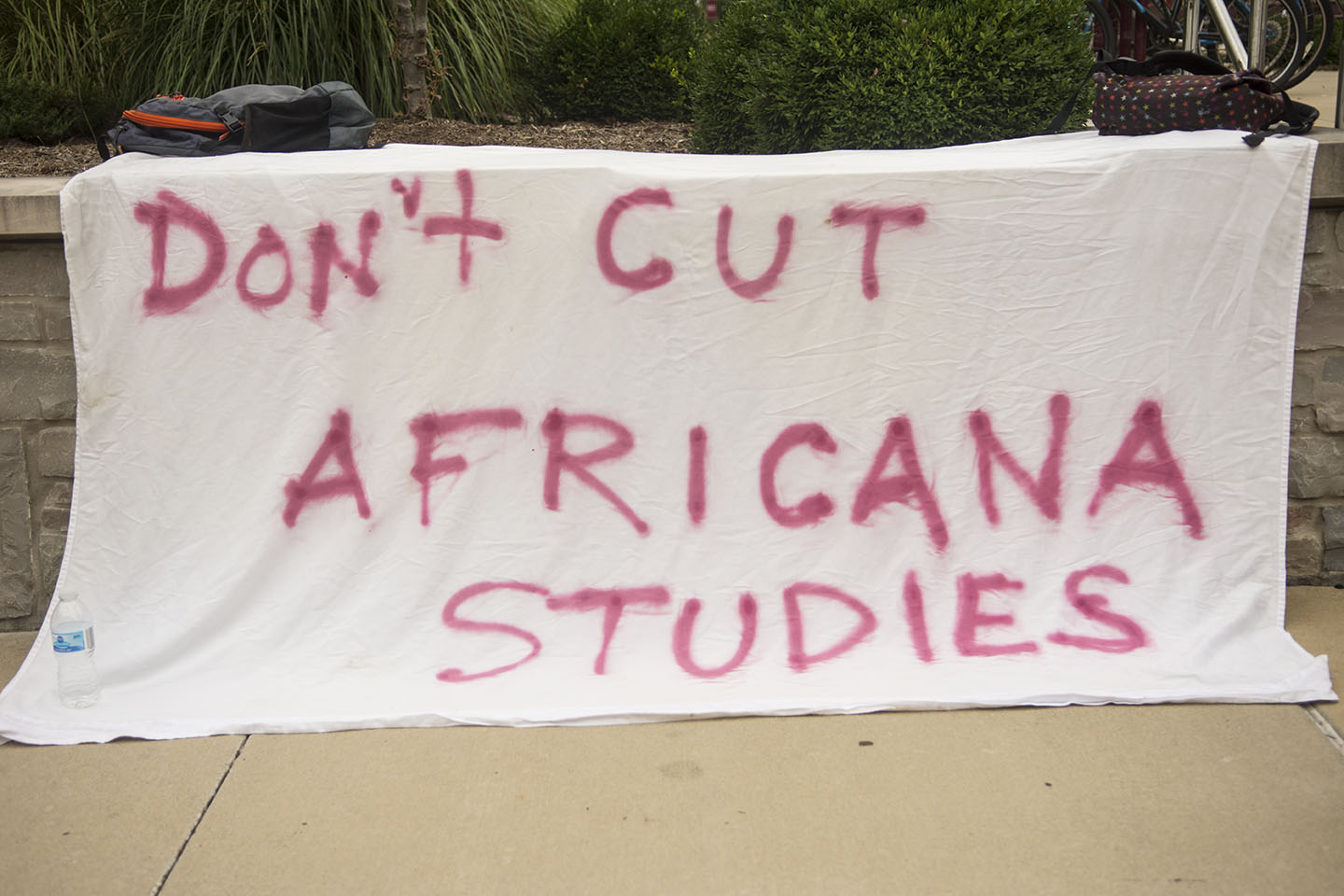Cutting Africana studies sets a ‘dangerous precedent,’ department members say
A banner stating “don’t cut Africana Studies” sits outside the Student Center Tuesday, Aug. 22, 2017. Students and alumni gathered outside the Student Center to protest the removal of the Africana Studies program from SIU. Athena Chrysanthou | @Chrysant1Athena)
August 29, 2017
As Africana studies students, faculty and staff come to terms with the administration’s recent decision to cut the program, many are taking it as a sign university leaders don’t know what students want.
“They are cutting things students care about — that they need and there’s a want for,” said Bethany Peppers, a junior from Urbana studying political science and Africana studies. “I see it as setting a dangerous precedent and starting down a slippery slope.”
The undergraduate degree program is on the chopping block following Board of Trustees approval of the “Financial Sustainability Plan” in July. This plan would cut about $26 million from the university, including seven degree programs. The bachelor’s in Africana studies is one of these.
Advertisement
Peppers said having classes about the history and culture of African-Americans and other Africans is especially important in today’s racial climate.
“Being culturally competent is extremely important,” Peppers said. “Especially when you consider all the things that are affecting our students — there is so much hate and division, and a lot of it just miseducation and ignorance.”
The decision to cut programs was “based on a significant history of low enrollment and substantially weaker comparative performance on other metrics,” according to the plan.
Pamela Smoot, a clinical assistant professor in the department, said enrollment numbers shouldn’t be a major factor in the determination to axe a program.
“Those can be improved,” Smoot said. “This is not the only department where the enrollment is low.”
Father Joseph Brown, a professor in the department who has been at SIU since 1997, said university policy made the Africana studies enrollment numbers appear lower than they were.
If a student does a double major, their second major is not accounted for in that department’s enrollment numbers, Brown said.
Advertisement*
When the decision to cut the department was made, Brown said the department’s viable majors were tallied at eight, but in reality, they had 26 students majoring in Africana Studies along with another program.
“The data that they have utilized to justify the elimination proposal is suspect and does not hold up under scrutiny,” Brown said. “The proposed cuts are a deliberate misrepresentation of reality.”
Brown said the Africana studies Department has consistently lacked institutional support.
When department was created in 2010, it had six teaching faculty, Brown said. Now it has three.
“We have begged for replacements,” Brown said. “It’s obvious we are not institutionally supported to be able to do the job we are required to do. We don’t hire faculty, we request them.”
Two university program reviews conducted in 2010 and 20112 found that the department needs seven to 12 faculty members to carry out its academic mission. No additional faculty have been hired since the reviews were carried out, Brown said.
Brown said with the department being understaffed, it is nearly impossible for faculty members to take sabbaticals. He said these are crucial for research, building one’s portfolio and mental health.
“It’s not because we don’t want to take time off,” Brown said. “There’s no one to replace us in the classroom.”
Leonard Gadzekpo, an associate professor in the department, said cutting Africana Studies will be detrimental to students.
“It undercuts the intellectual development of students,” Gadzekpo said. “Given that we are living in a diverse society, it is important that the students at least have intellectual contact. Africana studies gives them that.”
Students staged a demonstration Aug. 22 to protest the department being cut, but many faculty members and students were upset that the Africana studies department wasn’t contacted to participate.
“Independent actions are wonderful but collaborative action is powerful,” Brown said. “I know one thing about community organizing — you work on behalf of, not instead of … you learn what is important to them and you help them to do something.”
Smoot echoed that sentiment.
“My question is always: how many courses in Africana Studies have they taken?” Smoot said, referring to the protesters. “If the people protesting were actually taking the classes, then there wouldn’t be a problem of enrollment numbers.”
Staff writer Amelia Blakely can be reached at [email protected] or on Twitter @AmeilaBlakely.
To stay up to date with all your southern Illinois news, follow the Daily Egyptian on Facebook and Twitter.
Advertisement








Victor White • Sep 15, 2017 at 2:11 pm
I fully support Bradley Skelcher’s statement and agree wholeheartedly that the Africana Studies undergraduate program and the the doctoral Historical Studies Program needs to be preserved at SIUC.
Justin • Aug 30, 2017 at 12:12 pm
Makes me ashamed to have graduated from there
Bradley Skelcher • Aug 30, 2017 at 9:57 am
Sorry. I meant We need to preserve what it means to be an educated person.
Bradley Skelcher • Aug 29, 2017 at 12:49 pm
I support the Dr. Brown and the movement to save Africana Studies. I would also like to add that we need to save the Ph.D. Program in Historical Studies. I earned my Ph.D. in Historical Studies in 1990 and am currently a professor of History and Associate Provost at Delaware State University, a Historically Black College and University (HBCU). We must not forget the importance of history and culture in higher education. I fear that SIUC is losing sight of its liberal arts and teacher education legacy. Please continue offering these degree programs. We need to preserve what is means to be an educated person.